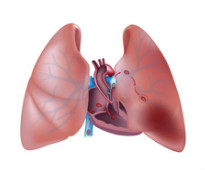pharmafileApril 23, 2019
Tag: FDA , cell , Lung Cancer

Specifically, the indication relates to stage 3 patients who are not candidates for surgical resection or definitive chemoradiation, and those whose tumours express PD-L1 as determined by an FDA-approved test, with no EGFR or ALK genomic tumour aberrations.
In the study, 1,274 participants were randomised to receive either Keytruda intravenously every three weeks or an investigator’s choice of a carboplatin-containing regimen with either pemetrexed or paclitaxel.
It was found that Keytruda demonstrated "statistically significant" improvements in overall survival (OS) in all patient groups with ≥50% PD-L1 expression, ≥20% PD-L1 expression and the overall population, meeting the trial’s major efficacy measures.
"The KEYNOTE-042 trial demonstrated a survival benefit with Keytruda monotherapy across histologies in certain patients with stage 3 or metastatic non-small cell lung cancer whose tumours expressed PD-L1 in at least 1% of tumour cells," explained Dr Gilberto Lopes, Associate Director for Global Oncology at the Sylvester Comprehensive Cancer Center at the University of Miami. "As a practicing oncologist, having additional options available for patients is important in the rapidly evolving treatment landscape for lung cancer, which remains the leading cause of cancer death in the United States."
"This expanded first-line indication now makes Keytruda monotherapy an option for more patients with non-small cell lung cancer, including those for whom combination therapy may not be appropriate," added Dr Jonathan Cheng, Vice President, Oncology Clinical Research at MSD.
Register as Visitor to CPhI China 2019!

-----------------------------------------------------------------------
Editor's Note:
To apply for becoming a contributor of En-CPhI.cn,
welcome to send your CV and sample works to us,
Email: Julia.Zhang@ubmsinoexpo.com.


Contact Us
Tel: (+86) 400 610 1188
WhatsApp/Telegram/Wechat: +86 13621645194
Follow Us:




 Pharma Sources Insight January 2025
Pharma Sources Insight January 2025


